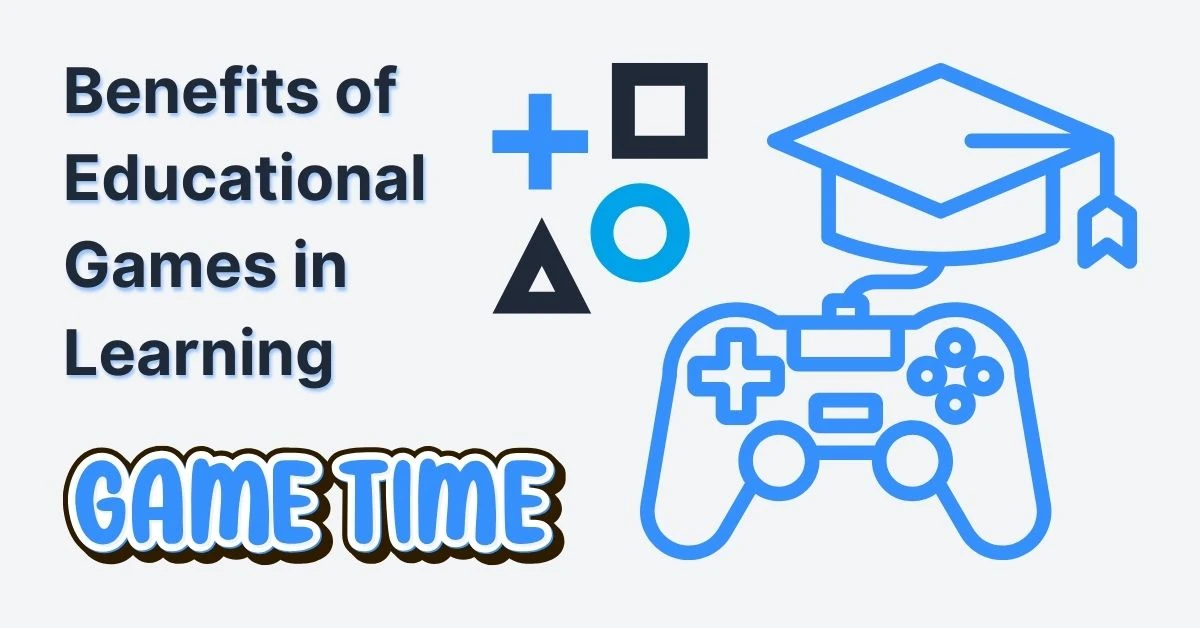Learning doesn’t have to be boring anymore. Gone are the days when students had to memorize facts from thick textbooks while fighting to stay awake in class.
Today, smart teachers and parents are discovering something exciting: educational games make learning fun and effective. These games help students understand difficult concepts, remember information longer, and actually enjoy studying.
But what exactly are the benefits of educational games in learning? And how can they transform your educational experience? Let’s explore everything you need to know.
Studies from Edutopia show that game based learning increases engagement and helps students grasp concepts faster.
What Are Educational Games?
Educational games are specially designed activities that teach while entertaining students. They combine learning objectives with fun gameplay to make education more engaging.
These games come in two main types:
Digital Games:
- Online learning apps
- Computer-based games
- Mobile educational apps
- Virtual reality learning experiences
Non Digital Games:
- Board games for learning
- Classroom activities
- Puzzles and brain teasers
- Role playing exercises
The main goal is simple: help students learn new skills and knowledge while having a great time doing it.

Top 10 Benefits of Educational Games in Learning
1. Makes Learning Fun and Engaging
The biggest benefit of educational games in learning is that they turn boring lessons into exciting adventures. When students play games, they forget they’re actually studying.
Why this works:
- Games trigger the brain’s reward system
- Students feel excited to reach the next level
- Learning becomes an adventure, not a chore
Example: A math game where students solve equations to save a virtual world is much more exciting than solving the same problems on paper.
2. Improves Memory and Information Retention
Educational games help students remember information much longer than traditional methods. The interactive nature of games creates stronger memory connections.
Key memory benefits:
- Visual memory: Colorful graphics and animations stick in the mind
- Emotional memory: Fun experiences are easier to recall
- Repetitive practice: Games naturally encourage repeated learning
Research shows that students retain 90% of information when they learn through games, compared to only 10% from reading alone.
3. Develops Critical Thinking and Problem-Solving Skills
Most educational games present challenges that require students to think strategically and solve problems creatively.
Skills developed:
- Logical reasoning
- Pattern recognition
- Quick decision-making
- Creative problem-solving
Example: Strategy games teach students to analyze situations, predict outcomes, and make smart choices under pressure.
4. Encourages Active Participation
Unlike passive learning methods, educational games require students to actively participate in their education. This leads to deeper understanding and better results.
Active learning benefits:
- Students become creators, not just consumers
- Hands-on experience reinforces concepts
- Interactive elements keep attention focused
5. Provides Immediate Feedback
One of the strongest benefits of educational games in learning is instant feedback. Students immediately know if their answer is right or wrong.
Why immediate feedback matters:
- Students can correct mistakes quickly
- No need to wait for teacher’s response
- Builds confidence through quick wins
This instant response helps students learn faster and avoid developing bad habits.
6. Builds Teamwork and Social Skills
Many educational games are designed for groups, teaching valuable social skills that students need in real life.
Social skills developed:
- Communication: Explaining ideas to teammates
- Cooperation: Working together toward common goals
- Leadership: Taking charge when needed
- Conflict resolution: Solving disagreements peacefully
7. Accommodates Different Learning Styles
Every student learns differently. Educational games naturally support various learning preferences.
Learning styles supported:
- Visual learners: Colorful graphics and animations
- Auditory learners: Sound effects and music
- Kinesthetic learners: Touch and movement interactions
- Reading learners: Text-based challenges
8. Reduces Learning Anxiety and Stress
Traditional testing can create anxiety for many students. Educational games provide a stress free environment where making mistakes is part of the fun.
Stress reduction benefits:
- No fear of public embarrassment
- Mistakes are learning opportunities
- Relaxed atmosphere encourages risk-taking
- Builds confidence through small achievements
9. Develops Technology Skills
In our digital world, technology skills are essential. Educational games naturally teach students how to use various digital tools and platforms.
Tech skills gained:
- Computer navigation
- Digital problem solving
- Online collaboration
- Digital citizenship
10. Personalizes the Learning Experience
Educational games can adapt to each student’s pace and ability level, providing personalized learning experiences that traditional classrooms struggle to offer.
Personalization features:
- Difficulty levels adjust automatically
- Students progress at their own speed
- Extra help available when needed
- Advanced challenges for quick learners
How Educational Games Benefit Different Subjects
Mathematics
- Number games make calculations enjoyable
- Geometry puzzles help visualize shapes and spaces
- Word problems become interactive stories
Science
- Virtual experiments allow safe exploration
- Simulation games demonstrate complex processes
- Quiz games reinforce scientific facts
Language Arts
- Vocabulary games expand word knowledge
- Grammar games make rules memorable
- Story building games encourage creative writing
Social Studies
- Historical simulations bring the past to life
- Geography games make learning locations fun
- Cultural games promote understanding and tolerance
Potential Drawbacks to Consider
While the benefits of educational games in learning are impressive, there are some challenges to keep in mind:
Possible disadvantages:
- Screen time concerns: Too much digital gaming can strain eyes
- Distraction risk: Some students may focus more on fun than learning
- Technology dependence: Over-reliance on digital tools
- Quality varies: Not all educational games are well designed
- Cost factors: Some games and platforms can be expensive
Solutions:
- Balance digital and non digital activities
- Choose high quality, curriculum-aligned games
- Set clear learning objectives
- Monitor progress regularly
- Encourage offline application of learned concepts
How to Choose the Right Educational Games
Consider these factors:
- Age appropriateness: Match games to developmental levels
- Learning objectives: Ensure games align with curriculum goals
- Quality design: Look for well-reviewed, professionally developed games
- Engagement level: Choose games that maintain student interest
- Progress tracking: Select games that monitor learning progress
Tips for Parents and Teachers
For Parents:
- Play together: Join your child’s gaming sessions
- Set limits: Balance game time with other activities
- Discuss learning: Talk about what they learned from games
- Choose wisely: Research games before purchasing
For Teachers:
- Integrate thoughtfully: Connect games to lesson plans
- Provide guidance: Help students focus on learning goals
- Assess progress: Use games as part of overall assessment
- Train yourself: Learn how to use educational games effectively
The Future of Educational Gaming
The benefits of educational games in learning will only grow as technology advances. We’re seeing exciting developments in:
- Virtual Reality (VR): Immersive learning experiences
- Augmented Reality (AR): Blending digital and physical worlds
- Artificial Intelligence (AI): Personalized learning paths
- Gamification: Applying game elements to traditional lessons
Frequently Asked Questions (FAQs)
What are the main benefits of educational games in learning?
The main benefits include making learning fun, improving memory retention, developing problem-solving skills, encouraging active participation, and providing immediate feedback. Educational games also reduce stress and accommodate different learning styles.
Can educational games replace traditional teaching methods?
No, educational games should complement, not replace, traditional teaching. The best approach combines games with other proven methods like direct instruction, discussions and hands on activities.
Are educational games suitable for all ages?
Yes, but games must be age appropriate. Games for young children focus on basic skills and simple concepts, while games for older students can handle complex subjects and advanced thinking skills.
How do I know if an educational game is effective?
Look for games that have clear learning objectives, provide progress tracking, receive positive reviews from educators and align with curriculum standards. Effective games also maintain student engagement while delivering measurable learning outcomes.
What subjects benefit most from educational games in learning?
All subjects can benefit from educational games, but math, science and language arts often see the most dramatic improvements. Games excel at making abstract concepts concrete and turning repetitive practice into engaging challenges.
The Future of Educational Gaming
The benefits of educational games in learning are clear and compelling. These powerful tools transform education by making learning enjoyable, memorable, and effective.
From improving academic performance to developing crucial 21st century skills, educational games offer advantages that traditional methods alone cannot provide. They engage students, reduce anxiety, and create positive associations with learning that last a lifetime.
However, success requires thoughtful implementation. Choose quality games, set clear objectives, and maintain balance with other educational approaches.
The bottom line: Educational games aren’t just the future of learning they’re transforming education right now. Whether you’re a student, parent or teacher, embracing the benefits of educational games in learning can unlock new possibilities for academic success and personal growth.
Ready to level up your learning experience? Start exploring educational games today and discover how fun and effective learning can be!




